Fantasy MMA apps are an innovative way to engage fans and provide them with a more personalized experience in the world of MMA. MMA fantasy apps allow sports enthusiasts to create and manage virtual teams of real MMA fighters, competing based on the athletes’ actual performance in real-world events.
For businesses, investing in Fantasy MMA app development opens a door to create an immersive digital experience, attracting more users, driving traffic, and enhancing brand loyalty.
Fantasy sports are inherently competitive, social, and provide ample opportunities for users to showcase their knowledge and skills. By integrating features such as live scoring, social sharing, and interactive elements, MMA app can build stronger fan connections and boost retention even in fantasy mixed martial art app development.
A Fantasy MMA sports app is a mobile application designed to allow users to create their fantasy MMA teams. In these games, users select real MMA fighters from a pool of competitors, and their virtual team scores points based on the fighters’ performances in live matches.
These points are calculated based on several metrics such as wins, knockouts, takedowns, and fight duration.
The appeal of such an app lies in its ability to allow fans to immerse themselves deeper in the sport by managing and competing with their fantasy teams.
To build mma fantasy app fanbase growing globally, Fantasy MMA apps offer fans a novel way to participate in the sport beyond just viewing matches.
The Fantasy Sports Market size is estimated at USD 32.75 billion in 2024, and is expected to reach USD 62.58 billion by 2029, growing at a CAGR of 13.83% during the forecast period (2024-2029).
Fantasy sports have become a prominent social phenomenon. The sport’s increasing importance at an elite level attracts large investors, fantasy players, and fans alike.
From draft parties to brand marketing and sponsorships to playoffs, fantasy sports engage fans with the competition.
A shift in the sporting culture has occurred over recent years with the introduction of several sports leagues, including badminton, football, rugby, basketball, and volleyball.
In different countries, the growth of sports has been accelerated by technological progress, increasing use of smartphones, and internet penetration.
This growth highlights the increasing potential for Fantasy MMA app development. For businesses and app developers, the time to invest in Fantasy MMA apps is now, as the market continues to expand.

Fantasy MMA apps work by providing a platform where users can create virtual teams, pick fighters for upcoming events, and track the real-time performance of their teams. Here’s a brief overview of the key mechanics:
Users select real MMA fighters from a roster available for an upcoming event or season. Each fighter has a specific cost based on their stats and historical performance.
Points are awarded based on the actual performance of the selected fighters during live events. This could include points for victories, knockouts, submission finishes, significant strikes, and more.
Users can track their team’s performance live during the event. Real-time updates are crucial to keep participants engaged.
Many Fantasy MMA apps allow users to compete in private leagues with friends or in public leagues against other fans, creating a community atmosphere.
Users can win real or virtual rewards based on their team’s performance. Some apps also integrate betting or sponsorships, providing more monetization avenues.
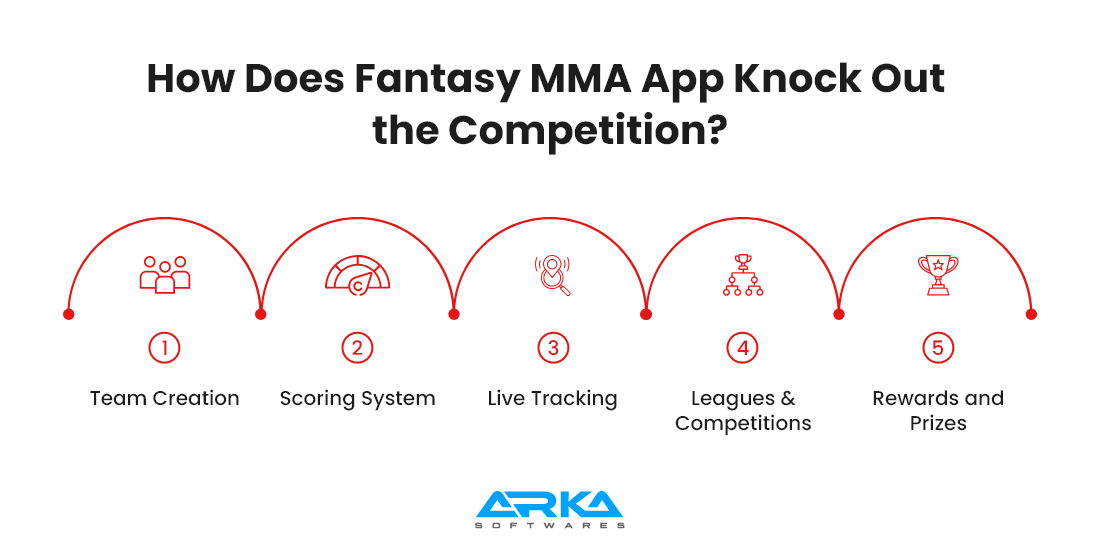
Businesses in the sports industry can benefit from Fantasy MMA mobile app development in several ways. Below are seven key advantages even to make mma fantasy app:
Fantasy sports apps allow fans to become more engaged with their favorite sport. MMA fans can track fighters, strategize team compositions, and experience live events with more personal investment.
Fantasy MMA apps open numerous monetization avenues, including in-app purchases, premium subscriptions, advertisements, and partnerships with sponsors.
By offering a unique and immersive experience, Fantasy MMA apps build stronger brand loyalty. Fans who engage with these apps are more likely to remain active and return for each event.
Fantasy MMA apps collect valuable user data, such as preferences, behavior, and engagement. This data can be used for targeted marketing, personalized content, and improving user experience.
Fantasy sports apps can attract a younger, more tech-savvy demographic that might not be as engaged with traditional sports broadcasts.
Fantasy MMA apps allow users to form leagues and interact with other fans, fostering a sense of community around MMA sports. Social sharing features can amplify the app’s reach.
Fantasy sports apps are highly scalable, enabling the integration of additional sports, features, or geographies. This provides long-term growth potential for businesses in the sports tech space.
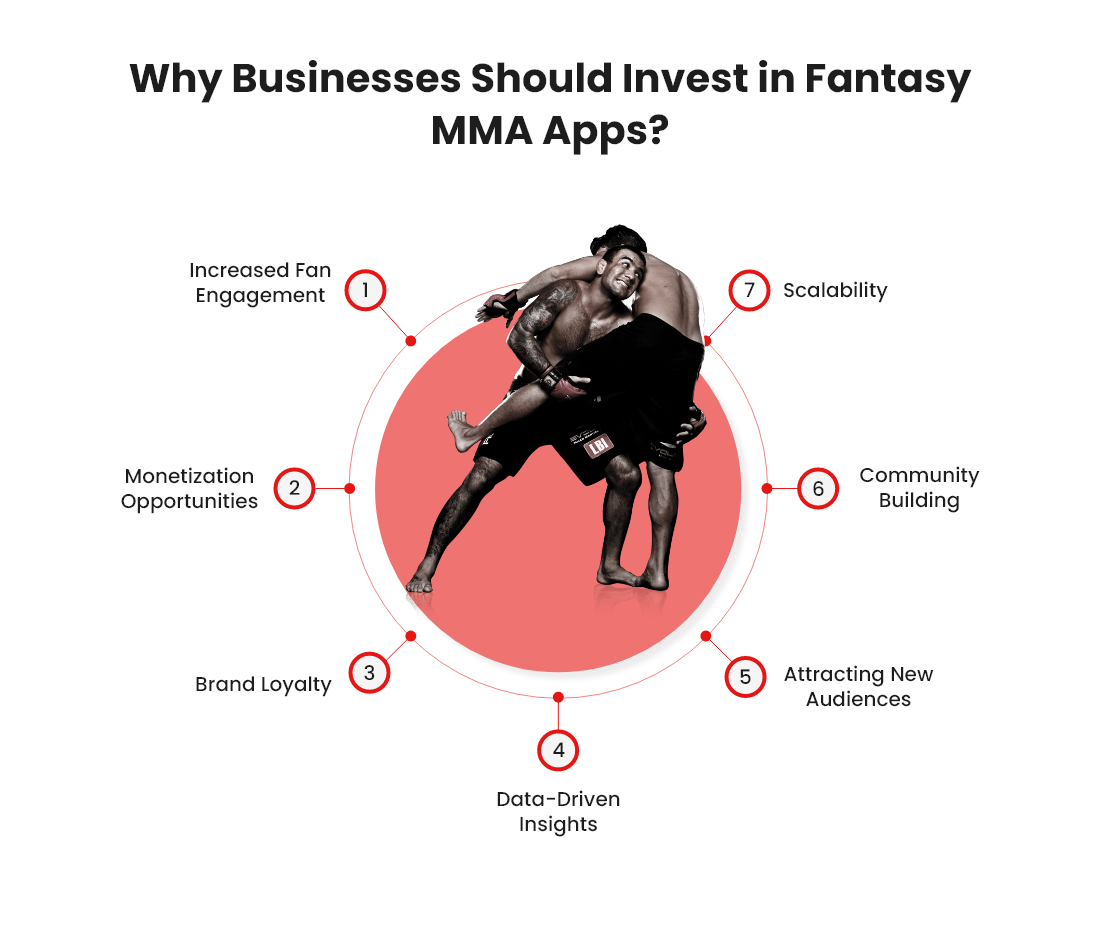
Looking at existing apps can provide great inspiration for building your own Fantasy MMA mobile app. Here are a few of the most popular Fantasy MMA apps in the market:
Though mainly known for its daily fantasy sports offerings, FanDuel allows fans to engage with MMA events. It offers real-time updates, leagues, and cash prizes.
DraftKings is another leading name in fantasy sports. It has integrated MMA into its platform, offering users the chance to draft fighters and compete in fantasy leagues.
Dabble is an MMA fantasy sports app where users create fantasy teams, draft fighters, and earn points based on real fight outcomes, allowing fans to compete and win prizes in MMA events.
UFC fantasy is an official fantasy game where users pick fight winners for each card. Points are earned for correct predictions, and users compete against others on leaderboards.
Prizepicks focuses on player props, where users predict specific performance metrics. Users can select between multiple picks and earn higher rewards by selecting more predictions correctly.

To create a successful Fantasy MMA mobile app, developers must consider several important features:
The app should be intuitive and easy to navigate. A sleek design with simple onboarding and registration processes will keep users engaged.
Users should have access to live scoreboards, updates, and notifications. Keeping users informed about their team’s performance in real-time is critical for engagement to create a fantasy mma app.
Enable users to create and manage their teams with ease. They should be able to change their fighters, track their stats, and adjust their team based on real-time events.
Social media integration is essential to promote sharing and engagement. Allow users to invite friends, join leagues, and share updates on their progress.
Leaderboards, badges, and rewards for milestones will incentivize users to stay active and keep competing.
If you plan to monetize the app with cash prizes or premium features, you’ll need secure and reliable payment gateways integrated into the app.
One of the vital aspects of fantasy MMA app features is push notifications. Send reminders about upcoming events, fighter news, or promotions. Notifications are important for retaining users and driving consistent engagement.
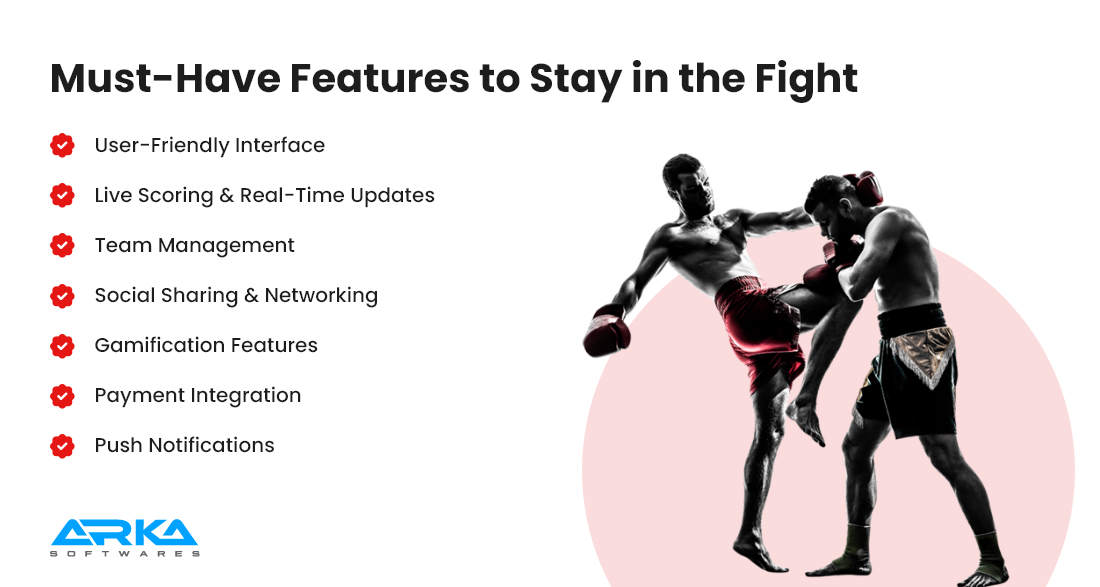
Given below are some of the key modules for fantasy MMA app development:
It Handles user registration, login, and profile setup. Manages user roles (e.g., admin, player) and access permissions. Allows social login and profile linking for ease of use. It tracks user history, such as past teams and contest entries. Provides account recovery options for password or username resets.
It allows users to draft fighters from an MMA event roster. Supports various drafting styles, like snake or auto-pick. It displays fighter stats, past performance, and upcoming fights. It highlights popular fighter picks and trends in the draft.
It calculates points based on fighter actions (e.g., strikes, takedowns). Applies customizable scoring rules per league or contest type. It tracks and updates scores in real-time as fights progress. Allows bonus points for specific fight outcomes like KOs or submissions. Updates leaderboards instantly to reflect scoring changes.
It Provides live updates on ongoing MMA fights. Integrates real-time stats for fighters during events. Shows key moments such as knockouts, submissions, and round wins.Notifies users of fight results, injuries, or significant events. Provides a visual display of live fighter performance and stats.
It Allows users to set up and edit their fantasy MMA teams. Supports changes in team lineup before lock-in deadlines. Displays fighter stats, injury updates, and recent performance. Allows for adding, dropping, or swapping fighters before fights. Tracks and displays team performance history across events.
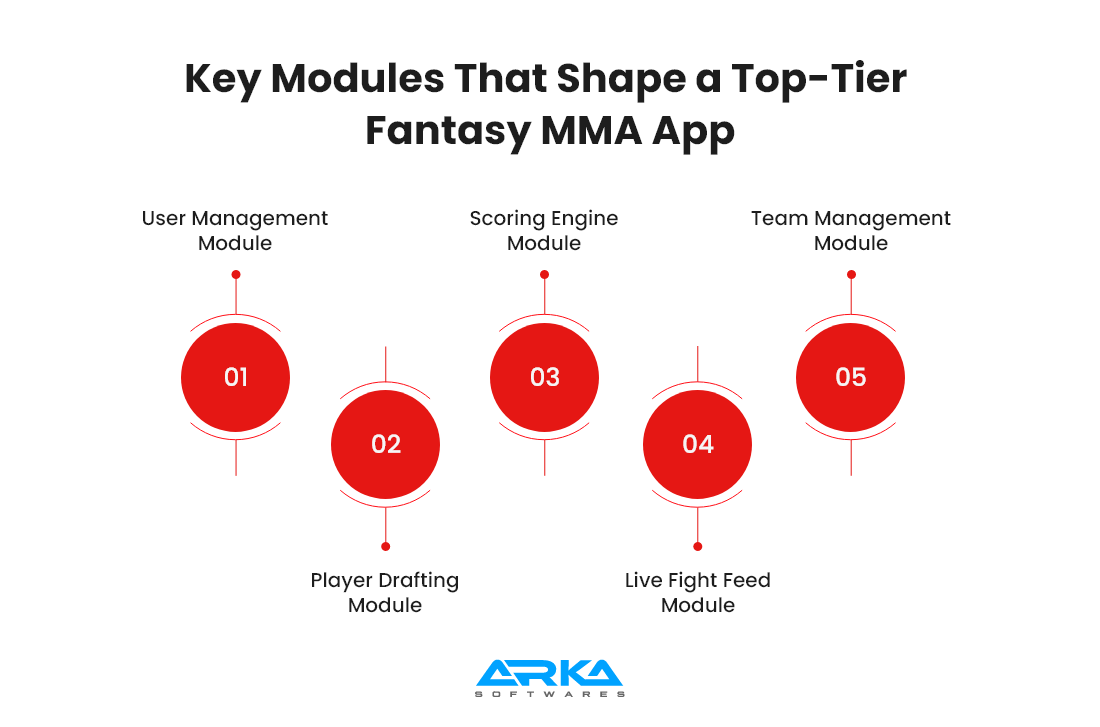
There are several monetization strategies for Fantasy MMA app development. Below are five ways these apps can generate revenue:
Users can purchase virtual goods, extra features, or premium content, such as enhanced stats or player insights.
Offer subscription packages for exclusive content, ad-free experiences, or advanced features like premium leagues.
Incorporate advertisements or partner with sponsors in the form of banner ads or sponsored challenges.
Charge users an entry fee to participate in premium leagues or tournaments. Winners can receive cash prizes, enhancing engagement.
Promote related products like MMA gear, tickets, or sports merchandise within the app, earning commission through affiliate links.
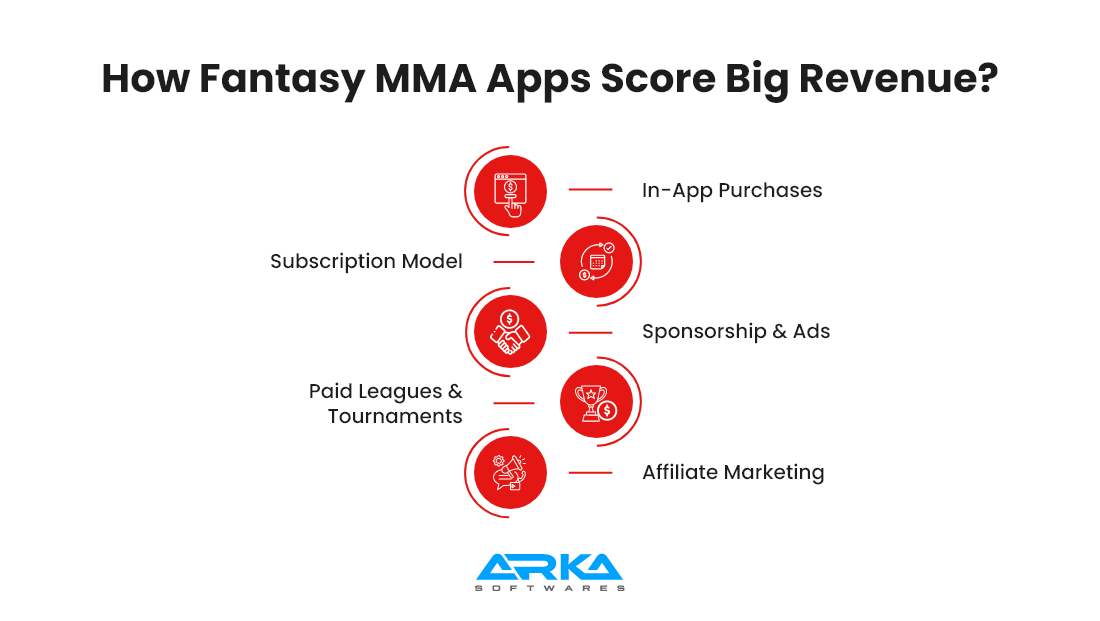
Developing a Fantasy MMA mobile app requires a combination of front-end and back-end technologies. Here is a typical tech stack for building a fantasy MMA mobile app:
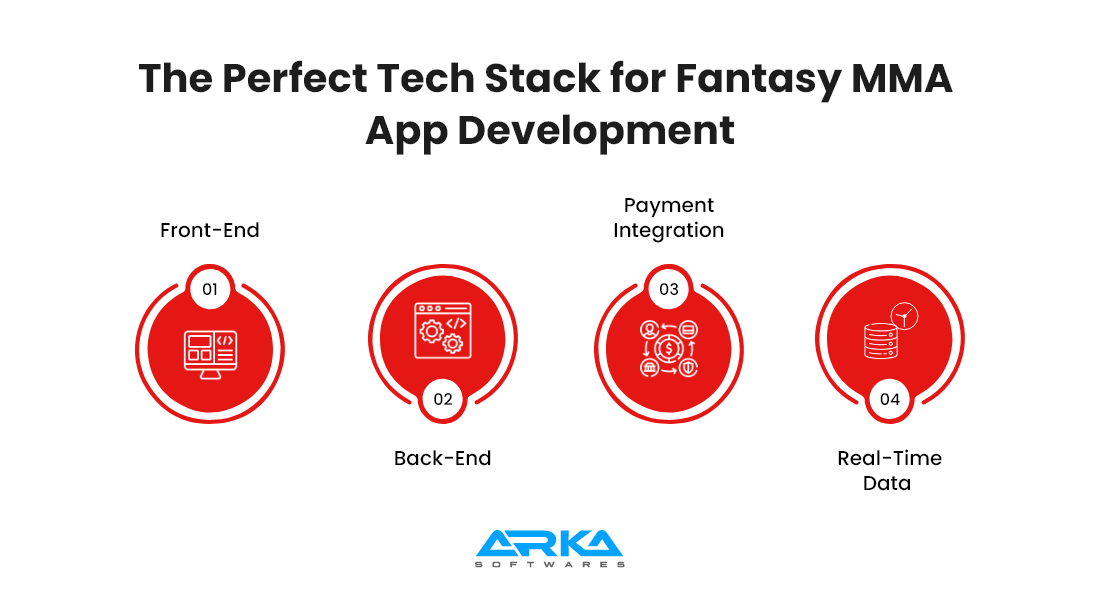
Developing a Fantasy MMA mobile application involves a multi-step process that blends sports, gaming, and mobile app development. Here’s an overview of the key steps involved:
Understand the market demand, target audience, and competitor landscape. Research existing fantasy sports apps (e.g., Fantasy Football, Fantasy Basketball) to gather insights. Conduct surveys or focus groups to gauge the interest of MMA fans in fantasy sports. Define core features (team creation, scoring system, matchups, etc.).
Outline all the features your fantasy MMA app will offer. Allow users to sign up, create accounts, and manage profiles. Users can create fantasy teams by selecting real MMA fighters. Score fantasy teams based on real fight results (KO, submission, etc.). Display rankings based on users’ performance. Schedule fights and track fighter performance.
Create an intuitive and engaging design for the app. Create basic wireframes that outline the app’s core screens and navigation. Develop visually appealing screens using MMA-related themes (e.g., fighter avatars, arenas, and events).
Focus on user-friendliness, easy navigation, and smooth interaction with features. Create an interactive prototype for testing.
Develop the app’s functionality using mobile technologies. Build the mobile interface for both iOS and Android using React Native services, Swift (iOS), or Kotlin (Android). Set up a robust backend infrastructure using cloud services (AWS, Firebase, etc.) to handle real-time data processing, fight results, scoring, and user management.
Ensure the app functions as expected and is free from bugs. Test the core functionality of the app, such as team selection, live scoring, and user registration. You can evaluate how intuitive and easy the app is to use. Ensure the app runs smoothly even with high traffic and live updates. Identify and fix any issues or bugs that arise during testing.
Release the app to the public and attract users. Submit the app to Google Play and the Apple App Store. You can create a marketing strategy to promote the app (social media ads, influencer partnerships, MMA-related promotions). You can focus on driving installs and sign-ups through online ads, partnerships with MMA influencers, and content marketing.
Continuously improve the app by adding new features and ensuring it runs smoothly. You can regularly fix any bugs that may arise post-launch. Introduce new features (e.g., fantasy leagues, betting options, more fighters). One can collect feedback from users to improve the overall experience and implement requested features. Refresh the app for major MMA events (e.g., UFC tournaments, fighter retirements, etc.).
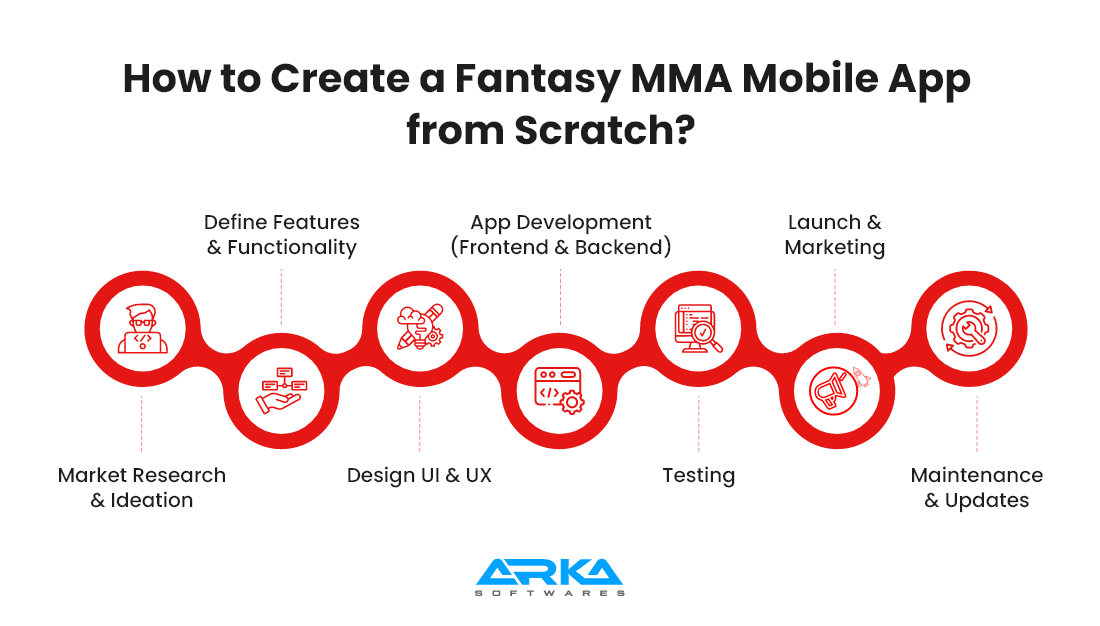
The cost to develop fantasy mma mobile app can vary significantly depending on several factors, including the app’s complexity, the features required, and whether you’re hiring an in-house team or outsourcing.
The cost of developing an MMA betting app typically ranges between $15,000 and $25,000 for a platform with essential features and functionality. The cost also depends on whether you develop fantasy mma app for iOS, Android, or both platforms.
However, this is a general estimate, and the final cost can vary based on several factors. To get a more accurate price for your specific project, it’s recommended to reach out to a reputable software development company specializing in fantasy or betting apps.
Advanced functionalities like real-time API integration for live fight updates, in-app purchases, complex scoring systems, and high-end graphics which influences Fantasy mma app development cost.
Read More: How to develop fantasy sports mobile app like dream 11?
As mentioned below are the differential factors of inhouse MMA app development vs outsource app development:
| Aspect | In-House Fantasy MMA App Development | Outsource App Development |
|---|---|---|
| Control & Communication | Full control over the project. Direct, constant communication with the team. | Limited control. Communication may depend on time zones and external parties. |
| Cost | Higher initial and ongoing costs (salaries, infrastructure, etc.) | Potentially lower initial cost, depending on the location of the outsourcing firm. |
| Team Expertise | Direct hiring of specialists suited to the project, tailored to needs. | Rely on the expertise of an external company, which may or may not align perfectly with project needs. |
| Flexibility & Changes | Easier to make quick changes or adjustments as the team is in-house. | Modifications can be slower and more costly due to reliance on third-party schedules. |
| Speed of Development | Generally faster if the team is well-aligned and experienced. | Can be slower if communication or time zone differences impact the workflow. |
| Confidentiality & Security | Higher level of security and confidentiality, as all work is kept internal. | Risk of data breaches, intellectual property issues, and security concerns, especially with offshore companies. |
| Ownership & Long-Term Maintenance | Full ownership of the code, full control over future updates, and long-term stability. | Code ownership can be more complicated; long-term maintenance might require continued outsourcing. |
| Project Management | Easier to manage in-house with a direct chain of command and more cohesive workflows. | Project management may be fragmented across different teams and geographies. |
| Cultural Fit & Alignment | In-house teams are more aligned with the company’s culture and mission. | Possible cultural misalignment, which can affect understanding and product vision. |
| Innovation & Creativity | More potential for innovation as in-house teams are deeply integrated with the company’s vision. | Limited by the outsourcing company’s approach, though they may bring in fresh ideas. |
| Quality Control | High level of oversight and direct control over quality standards. | Quality may vary based on the outsourced team’s capabilities and commitment. |
| Scalability | More flexibility to scale up or down depending on needs and available resources. | Scaling can be more difficult and costly due to dependency on the outsourcing partner’s availability and rates. |
Arka softwares as a leading fantasy sports app development company specializing in creating sports and gaming applications. Arka softwares has experience in developing fantasy sports apps and can tailor solutions specific to MMA, including fighter data integration, scoring systems, and match scheduling. We offer customized app development, ensuring that the app meets your unique requirements and branding needs. Arka softwares can handle every stage of the development process from ideation and design to development testing, and deployment.
Developing a Fantasy MMA app involves significant investment, with costs varying depending on features, design, and functionality. A basic app may start at $20,000, while more complex platforms with features like live scoring, player stats, and social interaction can exceed $100,000. Essential features include user registration, league management, payment systems, and security measures. To remain competitive, incorporating real-time updates, dynamic player selection, and engaging user interfaces is crucial.
Developing a fantasy MMA app requires a well-structured approach that blends app development, sports data integration, user experience, and engaging features. First, you need to define the core concept of your app — whether it will allow users to draft their own teams based on real MMA fighters, predict outcomes of fights, or engage in fantasy leagues.
The cost to develop a fantasy MMA app can vary significantly based on factors like the complexity of features, design requirements, platform (Android, iOS, or both), and geographic location of the development team. On average, you can expect the cost to range from $50,000 to $250,000 or more. If you want advanced features like live streaming of fights, AI-based predictions, and deep social engagement features, the cost could be on the higher end.
The development timeline for a fantasy MMA app typically spans 3 to 9 months, depending on the complexity and scope of the project. Basic apps with minimal features (e.g., a simple fantasy draft system, basic fighter profiles, and a points system) may take around 3-6 months. However, more feature-rich apps with advanced functionalities, such as real-time fight data integration, social features, multiple leagues, and seamless payment systems, could take closer to 6-9 months.
To build a fantasy MMA app for both Android and iOS, you can choose between native development (developing separate apps for each platform) or cross-platform development (using a single codebase for both platforms). Native development requires separate development teams or developers skilled in Java/Kotlin (for Android) and Swift/Objective-C (for iOS), which can increase both time and cost.